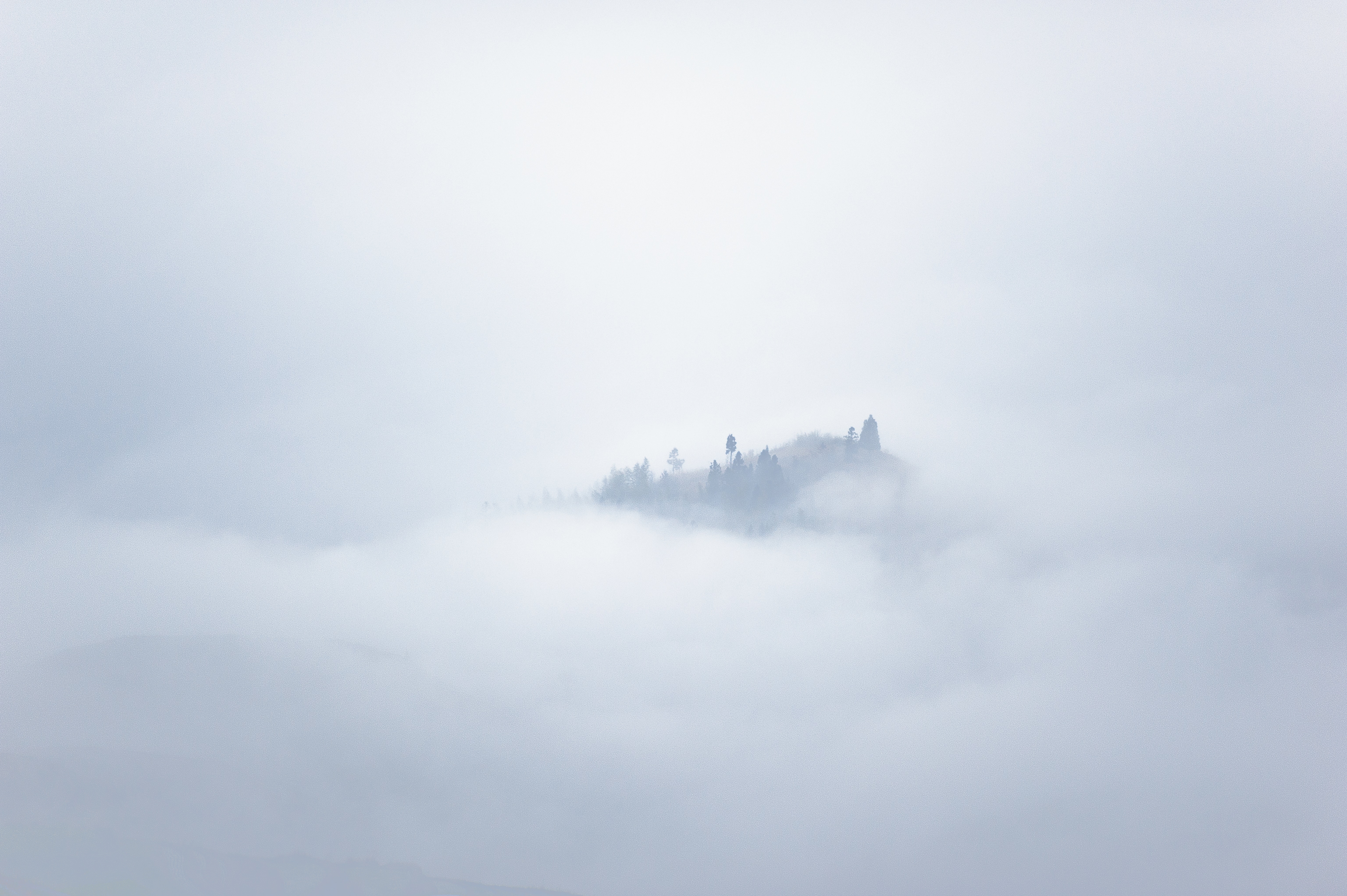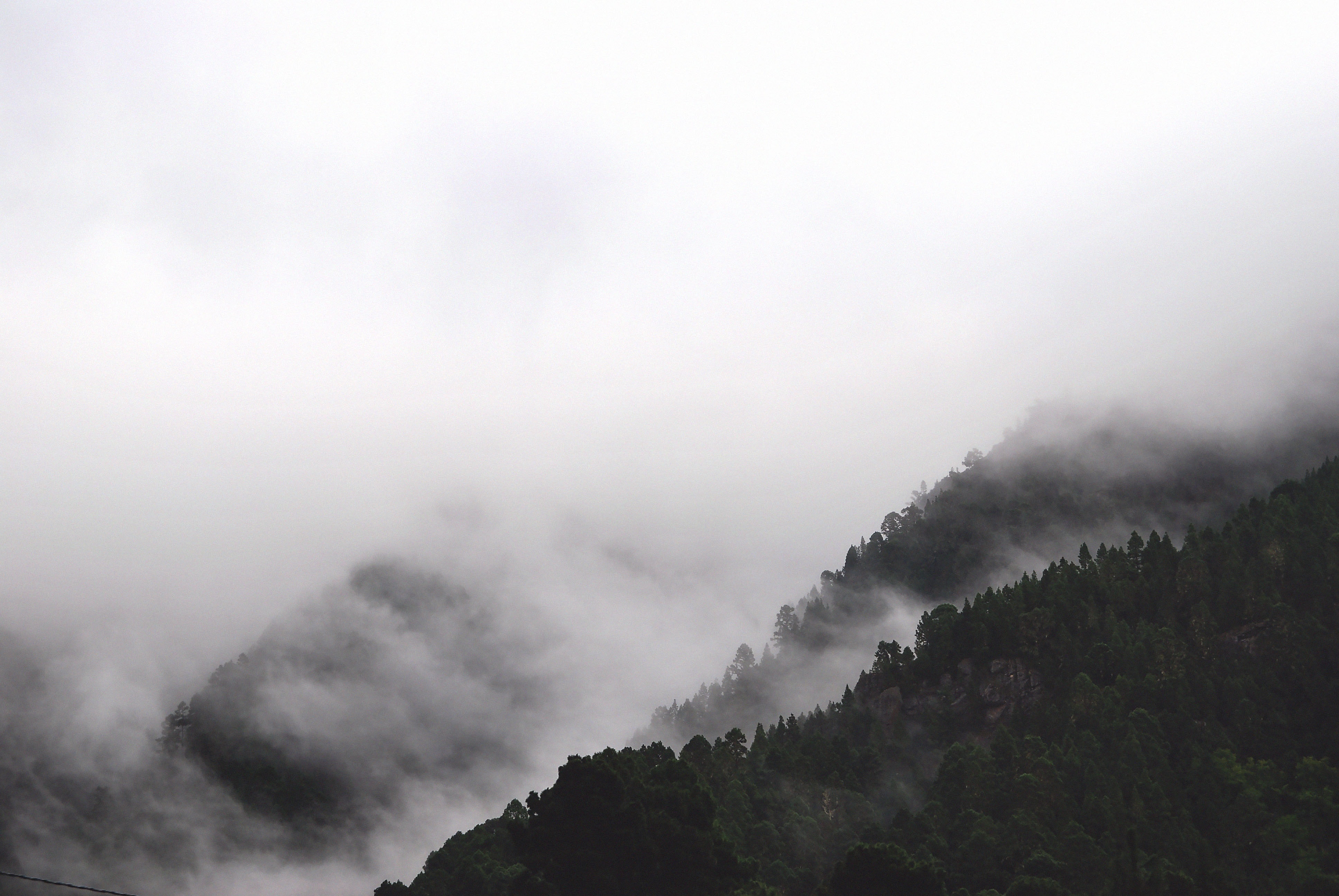November 2018
 I’ve pilfered the title of a work of medieval mysticism for this post because it captures exactly what I want to talk about: what we don’t know and how much of our native state is formed by that absence of knowing, of understanding, of certainty. Curiously enough, awareness of that state requires mental excavation because we overlay it with the certainties we use to make ourselves competent creatures in our daily lives. It would hardly do, for example, to get into the car to go to the supermarket and say to yourself, “OMG I know nothing about carbon combustion reactions, the engine runs on internal combustion, so what do I do if something goes haywire with the potential energy of the gas in the tank?” We get in, turn the key and take off, done and dusted.
I’ve pilfered the title of a work of medieval mysticism for this post because it captures exactly what I want to talk about: what we don’t know and how much of our native state is formed by that absence of knowing, of understanding, of certainty. Curiously enough, awareness of that state requires mental excavation because we overlay it with the certainties we use to make ourselves competent creatures in our daily lives. It would hardly do, for example, to get into the car to go to the supermarket and say to yourself, “OMG I know nothing about carbon combustion reactions, the engine runs on internal combustion, so what do I do if something goes haywire with the potential energy of the gas in the tank?” We get in, turn the key and take off, done and dusted.
As long as we stay in the well-worn ruts of daily life things look quite solid and certainty isn’t hard to come by. Life would be impossibly anxiety-ridden otherwise and most humans don’t thrive on anxiety, they do whatever they can to stabilize things in the interests of security and predictability. There’s nothing wrong with that. A girl can only take so much hoorah, after all, and the last thing she wants to do is break out in a sweat and have her foundation go all streaky. The tendency is to shy away from uncertainty unless there’s a good reason to embrace it — for example, a yen for a bit of daring-do, or the thrill of sticking your neck out on a theoretical long shot in the hope of winning the Nobel Prize. Certainty and predictability are, however, what most people want as their daily fare. We share that penchant with all other species on the Planet.

The extant manuscripts of The Cloud of Unknowing date from the middle of the 15th century, although when exactly the work was written is unknown (which seems entirely appropriate given the title). It’s a guide to contemplative prayer, shepherding the devotee through reading and spoken prayer to meditative prayer past language and even past thought. The goal is mysticism’s Holy Grail: union with the essence of God and communion with His beingness. There are parallels in other religions, of course — in Zen Buddhism, for example, doing zazen meditation is much the same procedure albeit with a somewhat different end goal. There are similar practices in Theravada Buddhism. In Islam the Sufi tradition embraces the same agenda.
If we fast forward to Science, which has replaced religion as the dominant ideology in the modern world, we find that things are not far off that same mark. There is unknowing, true, but data will bring us into the embracing arms of certainty if only we hit on the right theories and do the right experiments to prove them. Science, like religion, is teleological to the core. It deals with unknowing as a problem to be solved, an obstacle to be overcome, a temporary limitation subject to ultimate erasure by human consciousness which measures itself on the scale of omniscience, however much the fullness of that measure remains unrealized. Underlying the agenda of Science is the idea that humans can with enough time and effort figure out everything — i.e. read the mind of God, to put it in religious terms. That agenda is why it can function culturally as a substitute for religion. The real issue is the human desire to escape unknowing and to be embraced in certainty beyond all possible doubt. The truth shall make you free, so goes the saying, but that’s the last thing human beings want. They want to be wrapped up in the truth like a babe in tight swaddling clothes. They want the certainty of the saved.
The purpose of ideology in human affairs is to conceal larger truth and to induce people to believe something false that serves the purposes of those people whom the ideology benefits. If we take Science as an ideological instrument in modern civilization and grant it a religious function, then what it’s supposed to do is legitimize specialized knowledge as a privilege and bolster the position of those who pursue it. The benefits always involve money. One small example is the Large Hadron Collider and the Higgs boson. Here’s the skinny from an article in Forbes by Alex Knapp from 2012 (here) — and if anybody knows money, it’s our boys over at Forbes:
The Large Hadron Collider was first turned on in August of 2008, then stopped for repairs in September until November 2009. Taking all of those costs into consideration, the total cost of finding the Higgs boson ran about $13.25 billion. That’s a large amount, but there are over 50 billionaires on the Forbes list actually worth more than that. The money itself is provided by the CERN member countries, and a little over 70% of the annual budget is provided by Germany, the U.K., Italy, France and Spain. The money for the experiments also comes from large institutions such as universities and observer governments such as the United States, India, and Russia.
$13.25 billion is larger than the 2018 annual budget of 148 sovereign states. All that money to find a blip on a detector array … which still leaves the thorny issue of quantum gravity dangling in the wind like dirty laundry, together with myriad other questions still to be answered before we become Masters of the Universe. It’s gonna cost a fortune, that’s crystal clear. In the meantime thousands of people starve to death everyday. But by golly we nailed the Higgs boson, which is much more important, right? Right?
Being an erstwhile humanitarian I know full well it’s insane to think that so enormous an amount of money would ever be allocated to the eradication of poverty. Such things don’t really matter. Science matters. As a civilization we look to it to buy us certainty about our ability to dominate our physicality. The high priests — the Science Guys — are shamans who will do the right sacrifices on the altar of Science to secure us that salvation. That’s the teleology underneath the Science agenda, although since it’s an ideological agenda nobody would ever come out and say so. “Mum’s the word” is part of that shtick, as it always is with ideologies. The close collaboration of science, industry and government tells the tale — the notion of “pure science” is also part of the ideological fast footwork. But follow the money, track the connections in the scientific hierarchy and all shall be revealed unto you.
I’ve puzzled long years over this twisted minuet without ever coming adequately to terms with it. Since I’m societally superfluous now as a retiree and needn’t worry about finding my place in the human scheme of things from a practical standpoint, I’m content to let it sink into the quantum foam. The time I have left on the Planet is short, relatively speaking, and nothing much will change before I’m no longer among us. The teleology of my own biology takes precedence now and we all know where that ends: in yet another cloud of unknowing.

Uncertainty is also fueled by the increasing specialization in knowledge, which continues its forward march to the point that regular folk inevitably get lost in the cracks between knowledge domains. It happens to professionals, so how could we of the Great Unwashed avoid it? There’s just too much to know, you can’t possibly keep up in all the important areas. In the 18th century you could know all there was to know after a few years of study. We long ago abandoned that notion by dint of necessity. Nowadays we float out into the cloud of unknowing like somebody wearing antigravity boots on with nothing to grab hold of.
The state of unknowing has become a permanent fixture of our daily lives on the Planet. It’s up close and personal because we only understand a small percentage of the objects and processes that make daily life run. Here’s one small example. I don’t need to figure out how to make dishwashing detergent, mass produce plastic bottles to put it in, or organize the distribution logistics that get it from a factory in God knows where to my local supermarket. All I do is buy the stuff, grab a sponge and get cracking. We mentally bracket out all the dependencies in that causality sequence as a matter of course. (We’ll also bracket out the fact that I asked Madge which detergent is best because only my manicurist knows for sure LOL.) Hidden from view are all the lab chemists busy concocting the stuff from who knows what compounds (no point in knowing since I’d never be able to pronounce the names anyway), the specialists in injection molding making the containers for the least cost per unit to keep their market share up, the trucker who ferries the stuff across our crumbling Interstate highway system or the poor git who ends up shuffling it from the supermarket loading dock to the shelf from which I pluck it as I sail past in my single strand of pearls with a smile on my lips and a song in my heart. On the surface of things there’s just me, a bottle of detergent and some dirty dishes. In reality, there’s a cast of thousands involved in that seemingly simple scenario.
So it is with most everything in daily life. When I wander the aisles of the supermarket I often think of the lives of all the people who’ve been involved in the production of all the stuff I see ranged on the shelves. Somebody’s gotta do it, the stuff doesn’t just grow on trees. So we’re all in this together, in point of physical fact, but that fundamental physical truth is overlaid by all sorts of mental deflections that keep it well hidden from plain sight and keep all of us in very separate boxes. We hold awareness of none of that truth as we live our daily lives. In other words, we’re not being real.

The cloud of unknowing also envelops the basic conditions of our physicality. And we can count our lucky stars it does, too. Nobody needs to ride herd on the quantum dynamics of the particles that make up our bodies. Electromagnetism appears to chug along quite well without any tweaking on our part. The millions of chemical reactions that accomplish our metabolism work like a charm beneath our conscious awareness, busily putting molecules together and taking them apart with the end result of us running around in a body that does what it’s supposed to do. Gravity seems quite reliable without any outside intervention. When I sit down on a chair I invariably stay there rather than having to rope myself down so I don’t float off into space. Handy! And somewhere out there as we speak some supermassive star is going into supernova stage and thereby synthesizing heavy elements that some lifeform may end up using in its biological systems at some point in the future, just as we’ve done without thought or concern all along. It’s all just there and just hums along like clockwork. The order that underpins it all is for the most part beyond our ken and many orders of magnitude greater than anything we humans have cobbled together. That’s another truth we don’t hold in mind on a daily basis. We like to pretend we’re king of the hill, but that’s a fib.
At this juncture we arrive at a point of departure for creating a stance as an individual inhabiting the cloud of unknowing all of us live in. I think the key is to expand the cloud as much as possible rather than to contract it or to sweep it under the rug. That sounds like crazy talk, I realize, but instead of being looney it’s the truth that sets us free because it aligns us with what is real.
The only possible basis for being real is to deal with reality rather than to be an ideologue and tell yourself a bunch of fibs. To remain centered in your cloud of unknowing is the only possible basis for an individual perceptive stance that does justice both to the integrity of individual consciousness and to its physical position in the scheme of things. Our cloud of unknowing is real, so only by embracing it can we also be real. That seems a matter of simple logic to me.
Consciousness in humans operates as a cloison étanche, a walled-off unit of awareness that can only be shared indirectly with other humans through behavior or language that represents it at second hand. There’s no collective equivalent in human consciousness to the level of individual ego awareness. If you take Jung at his word you may hold that there’s something approaching collectivity at the subconscious level, but see just how far that specious currency gets you when you’re in a cafe dying for a caramel macchiato. We’re dealing with the cash on the barrelhead of ego-aware consciousness here, not subterranean rivers of God knows what flowing God knows where. When push comes to shove, it’s down to you and you alone. Me and me alone. That’s just how consciousness works for the animals we are.

Using those facts as our foundation, we’re ready to inflate our cloud of unknowing. It can be as large as you like, there’s raw material in astronomical abundance at your disposal. Here are just a few tidbits from my own cloud:
- we have no idea how human consciousness forms or what happens to it after death
- we have no idea how many species have lived on the Planet
- we have no idea how many species currently live on the Planet
- we have no idea how our Universe began or even if it is finite and had a beginning
- we have no idea what our common ancestor with other primates was
- we have no idea of how many microbial symbiotic relationships the human body depends on
- we have no idea if there are other lifeforms in the Universe
- we have no full map of all the chemical reactions in our own bodies
- we have no idea what relation there is between human personality and human biology
- we have no idea what really happens inside a black hole
- we have no idea how to predict earthquakes or volcanic eruptions
That’s just for starters. The truth of the situation, then, is that what we know occupies a position similar to that of baryonic matter in the scheme of the Cosmos, calculated currently at approximately 4% of total mass. What the other 96% is escapes our understanding as well as our capacity for detection. We should call ourselves stars of the long-running soap opera “Four Percent Babes In Space.” Everybody gets a role, but the jury’s still out about whether there will be a spinoff …
Let’s move now from the general to the specific. My personal cloud of unknowing has grown over the years despite all the stuff I’ve learned. As the cliché goes, the more you know the more you know you don’t know. As an operational stance for the individual it’s important to latch onto the idea that ignorance isn’t dangerous in its rightful place. If you’re driving a stick shift and you don’t know how to use a clutch, then you’re in hot water. If you’re on the Planet hurtling along with it at 70,000 miles per hour around the Sun, it needn’t put a twist in your knickers if you don’t know the stellar nucleosynthesis sequence of supermassive stars, even though without that sequence you’d never have happened in the first place. The scale of time involved makes it all good, you’re off the hook. Remembering that we are Four Percent Babes means that everything outside our four percent is real but not always immediately practical for the mammalian biological units we are. So if you don’t know how to boil water and you want a cup of coffee, put on that thinking cap. If you bump up against the fact that you know nothing at all about the process by which your mitochondria produce the energy your body uses, just leave the rollers in and the hairnet on, it’s not an emergency.
The intention to stay real is critically important, however, and you’ll have to shift over to identification as a Four Percent Babe. It won’t do to continue in the ideological ruts to which you’ve become accustomed, because they’ll lead you straight off into La La Land. You don’t need to broadcast the shift on the six o’clock news for heaven’s sake, but you must make that change or you’ll just end up fooling yourself. It’s the only strategy I’ve found to keep things real. At this point it’s second nature. I have no interest in telling myself a bunch of fibs to bolster my human sense as I face the Cosmos. Four Percent Babes don’t tell fibs, it’s not ladylike. 🙂
The most important consequence of shifting to the four-percent stance is awareness of your true placement in the scheme of things. You become real on cosmic terms. It’s amazing what a relief that is, to be honest. We put ourselves before an impossible task when we think we’re in process of figuring everything out. Our consciousness isn’t equipped to do that job. From an evolutionary standpoint it makes no sense that our consciousness should be equipped to handle it, since there’s no way we could possibly act on such all-encompassing knowledge due to the inherent limits of our physicality. We’re mired in spacetime as tiny specks of matter in a vastness. Accepting the limitations of that state of reality is the only sensible approach.
If you want an example of what NOT to do, allow me to supply one: Michio Kaku. He’s the ultimate Science Guy ideologue. He should be wearing vestments and a mitre as one of the bishops of Science, spreading salvation to the Great Unwashed through the Good News about what guys like him are going to accomplish through Science to provide a fantastic future for humanity (well, for other Science Guys, as least). He seems to have put out of mind the fact that he, too, is a Four Percent Babe. His latest book, The Future of Humanity, leaves me spluttering in disbelief. For someone like me, a self-proclaimed and self-identified Four Percent Babe barely detectable in my cloud of unknowing, Kaku’s pages throw up so many red flags I can hardly make out what he’s saying. Once I do understand it my reaction is: are you SERIOUS?? Here’s a bit from a review in The New York Times by Adam Frank, himself an astrophysicist (full text here):
Kaku is a techno-optimist, as he has shown in his previous books on the future of physics and the future of the mind. In his view, there are frontiers of knowledge and capability all around us that we’ve only begun to explore. From space travel to genetic engineering to encounters with advanced alien civilizations, Kaku says that through science and technology few limits exist that can, or should, constrain us. Given enough time, he argues, we might become as the gods.
The first and most important limit for us to vault past is Earth itself. Kaku opens the discussion as to how humans might become a multiplanet species by quoting Konstantin Tsiolkovsky, the self-taught Russian genius who first conceived of rocket-based space travel: “The Earth is our cradle, but we cannot be in our cradle forever.” While the American space program has seemed rudderless for years, an era of New Space, led by Elon Musk, Jeff Bezos and other high-frontier entrepreneurs, has just begun. They are the ones making tangible accomplishments in lowering the cost of reaching space. (There’s a red Tesla Roadster orbiting Earth as you read this.) The vitality of the New Space movement means the next 200 years may well see humanity move from just exploring space to actually settling it.
Kaku maps the path to become a true multiplanet species, beginning with reaching, and then settling, Mars. This includes “terraforming” — the large-scale alteration of Mars’s atmosphere — for the benefit of its new human inhabitants. …
As counterpoint to the idea of terraforming Mars I’d like to offer this tidbit: we can’t even organize human life on this Planet so that everybody has enough to eat. And maybe we should ask the Securities and Exchange Commission about Mr. Musk before we get overly excited about his ability to fund space travel for humanity. “… we might become as the gods.” 🙁 If that statement isn’t enough to send your eyes rolling back in your head, I don’t know what is. If it isn’t, then map that statement to the number of people who die every day of starvation. One estimate gives the number as 21,000 — 14 times the population of my hometown. Is it any wonder the word “ideology” makes my gag reflex kick in?
If Kaku were just doing a bit of blue-skying I wouldn’t mind. It’s fun to let your imagination run wild once in a while. But he’s talking about realistic projections, not self-aggrandizing wishful thinking, and there’s the rub. He claims his proposals are based on facts, but the only way his claims make any sense at all is if you bracket out the rest of humanity except for the Science Guys and ignore the current reality of human life on the Planet. That kind of exclusion is what ideology is designed to do. But my momma didn’t raise no dummies and I’m not buying it, not for one second. It sounds to me like pure science fiction — and not very imaginative science fiction at that. The Mars stuff got hashed over in the 1950’s — go back and read some pulp SF novels from the period. All shall be revealed unto you.
So if we’re not going to rocket off with Kaku into La La Land, where do we go? Simple: just hunker down in your cloud of unknowing. It’s kind of like warm bathwater once you get used to it. Pretty soon you’ll find yourself cocking your head and shooting up your eyebrows when you come across things like the hoopypoop Mr. Kaku purveys and you’ll have a wry smile on your face when you hear somebody deny facts that stand in plain view. Those are the best responses — there’s no talking with ideologues. You might as well save your breath.

At the level of lived experience the individual who accepts the cloud of unknowing becomes differently contextualized — that seems a good if inelegant way to put it. Just think if you were a galaxy being held together by dark matter or dark energy or whatever it is — another thing about which we have absolutely no clue. The very thing that holds you together would be completely alien to your own physical being. So it is with the human individual and the cloud of unknowing. When we accept the fact as individuals that we are Four Percent Babes then a process of internal realignment begins that puts the framework of consciousness into a broader but in no way more nebulous configuration. The core of consciousness remains sharp, but just as heavenly bodies move about in spacetime occupied almost entirely by dark something, so does consciousness become constellated against its full background of unknowing as it moves through the domain of experience. The gravity of the cloud of unknowing imparts fuller reality to our point of consciousness. Without the inclusion of that pull, the definition of consciousness wouldn’t be real.
One’s sense of self expands to the macro level and becomes inclusive rather than exclusive. That inclusivity imparts a dimensionality I wouldn’t trade for anything in the world. It’s what makes me feel part of the Universe, of the Planet, of the biosphere, of everything. My humanity is one element among all those levels, a legitimate but in no way more important element in keeping with the scale in which it’s embedded. That’s exactly as it should be: it’s the reality of the situation.
Consciousness has its own agenda, of course — as legitimate as any other agenda in Creation — and since I have it I use it to the fullest extent I can. I have no idea if something of the sort exists elsewhere in the Universe in the concentrated, ego-aware state I have as a human being. Consciousness obviously has nothing superior about it with regard to order or elegance — the Universe has us humans beat hands down in those regards, as a look at the ingenuity of quantum mechanics or the astonishing inventiveness of Planetary biochemstry quickly reveals. What, then, is the agenda of my own consciousness beyond dealing with the mammalian overhead it confronts daily, which is the task it most likely evolved to perform?
My answer to that question comes once again from physics because I’m considering consciousness as an element of physicality. The agenda of my point of consciousness is to become as much as possible like a quantum field while at the same time expanding its core focus, which is like a particle. I can have that duality simultaneously because consciousness isn’t bound to reproduce slavishly the laws of matter. Therein lies its evolutionary splendor. It can operate beyond the physical constraints of matter while being part of physicality itself. My cloud of unknowing is my quantum field. I engage its reality by realizing that I don’t know everything. So rather than unknowing being a negation, it brings Reality to the party. Without it there couldn’t be a party for a creature like me.
If human history is the equivalent of the fossil record of human consciousness, I’d say there’s little evidence for any evolutionary trajectory at all. We go round and round in the same old rut, our civilizational imperatives reducible to mammalian characteristics such aggression, competition, domination, reproduction, etc. The fact that we’ve figured out lots of science things and manage to make a whole lot of stuff that humans of earlier times never dreamed of must certainly be counted as development, but is it evolution? Is our development leading us into a different kind of beingness, changing us in some way to be more orderly, more fitted to the physicality we inhabit? I can’t see it in the evidence history provides. Yes, we’ve sent a man to the moon (but not a woman LOL). And anyhoo, just what good did that moon walk do for the price of tea in China? Some Beltway Bandits made tons of money off it, but I fail to see any benefits accruing to the Great Unwashed of which I’m a card-carrying member. And I helped pay for the damned thing so I feel jipped. Harumph.
I wouldn’t call the changes I’ve observed in my own consciousness evolution, either. I find no noticeable change in its function, even though its dimensions have changed considerably. If pressed for a succinct catchword, I’d choose “phase change” as the one hitting closest to the mark. If I started out in solid state, then over my lifetime I’ve expanded and become much more gaseous LOL. If ever I should eject molecular nebulae I just hope it happens quietly so nobody can tell where they came from. 🙂
Continuing in the astronomical vein, I’m now in my last phase of stellar nucleosynthesis and since I’m far less massive than the sun I’ll end up as a brown dwarf, that’s as clear as the nose on your face. I have no clue what will happen to my consciousness after the last light is emitted and I become a cinder. It comforts me to think that the grand show of the Universe will continue after I’m extinguished. I like knowing that the atoms making up my body will re-enter the cosmic dance without my locus of consciousness as their companion. To them I say (with indebtedness to Dr. Seuss), “oh the places you’ll go!” The party will go on, and on, and on.
And if perchance I myself become part of that cloud of unknowing, then it’s befitting that I should merge with what has accompanied me all my days and been as much a part of me as the part that walks and talks and thinks he’s got stuff sorted out. It’s been there all the while, shaping me by its continual presence. If I end up as part of it, I’ll consider my final fate a good one.

